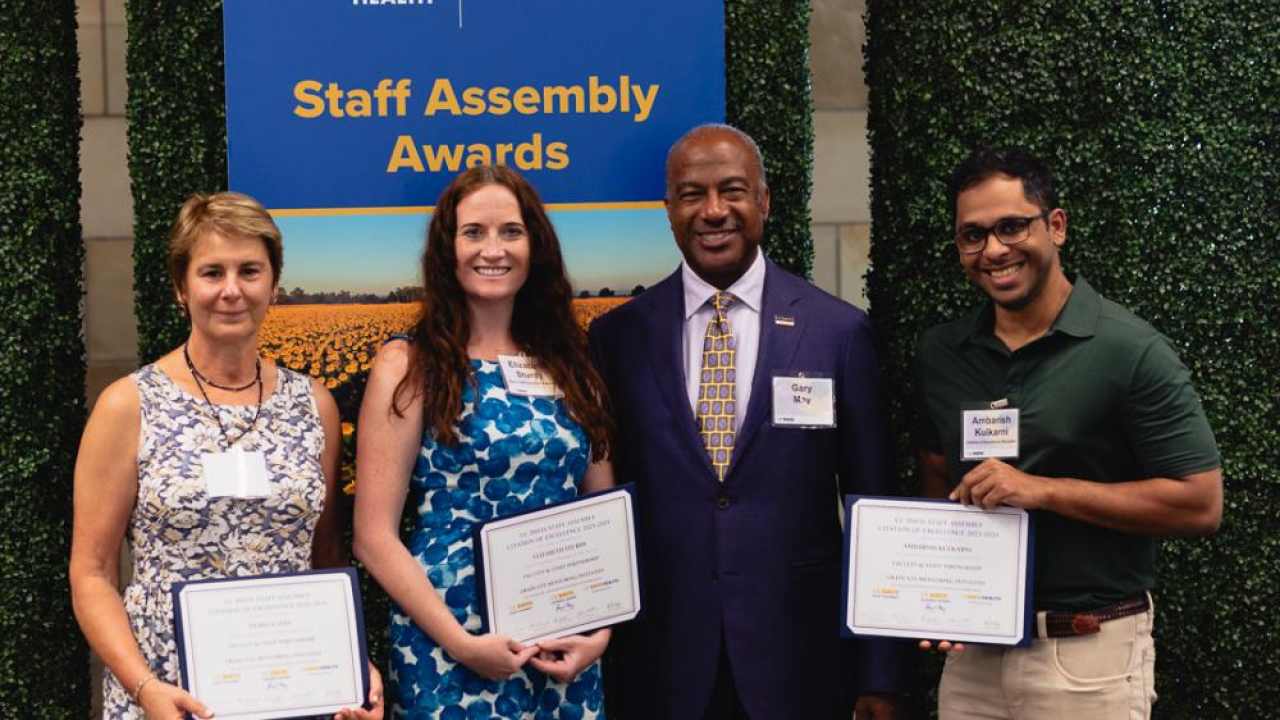
Graduate Mentoring Initiative Faculty-Staff Team Wins 2023 UC Davis Staff Assembly Citation of Excellence Award
In spring quarter 2021, Elizabeth Sturdy, director of mentoring and academic success initiatives in UC Davis Graduate Studies, in partnership with Pamela Lein, professor of molecular biosciences in the School of Veterinary Medicine, and Ambar Kulkarni, associate professor of chemical engineering in the College of Engineering, piloted the Graduate Mentoring Initiative, or GMI. The GMI offers a holistic mentoring program for UC Davis faculty members aimed at fostering a culture of faculty-graduate student mentoring. Now, two years later – with 150 faculty members already having participated in the program – Elizabeth, Pamela and Ambar are being recognized for their collaboration with a 2023 Citation of Excellence for Faculty & Staff Partnership through UC Davis Staff Assembly.
The annual Citation of Excellence awards honor UC Davis and UC Davis Health individual staff and staff teams who have demonstrated outstanding achievement in a number of areas, including mentorship. The 2023 awards allocated more than $17,000 to support the honorees. The GMI was one of two teams to win this year’s Faculty & Staff Partnership Award.
Offered quarterly to faculty participants, the GMI program consists of six interactive sessions covering a range of topics such as maintaining effective communication, addressing equity and inclusion, and articulating a mentoring philosophy. These sessions are co-led by faculty facilitators (known as “Mentor Fellows") and staff members, with subject matter experts from campuswide resources such as OMBUDS also involved in the programming. Thus, participants not only gain a variety of hands-on mentorship skills, but they also build a broader mentorship network.
In the award nomination letter submitted for the GMI, the program was lauded for its ability to “foster continued growth and connection.” The data behind the program supports this claim. At the beginning of the program, most participants self-identify as not having taken any previous mentoring training and rate their confidence in mentoring as “average.” Upon completion, mentorship confidence increases to “high” across most ratings, with participants finding strategies to address mentorship struggles and interactions with other faculty members particularly valuable.
“In my experience, the Graduate Mentoring Initiative has had numerous positive impacts on faculty mentorship,” said Lein, who, alongside Kulkarni, co-leads the GMI as a faculty representative. “Key among these are: (1) heightened faculty awareness of the importance of mentoring in the graduate experience as well as what constitutes effective or positive mentoring; and (2) the GMI has become an important resource for faculty to turn to when they have questions about interacting with graduate students or are dealing with challenging situations involving graduate students, which in turn has decreased their stress levels around mentoring and enabled them to more readily reach out to colleagues for advice.”
Creating a culture of strong mentorship within the graduate community remains a top priority for Graduate Studies. The MentoringUp! Program leverages the GMI interactive session model to help graduate students and postdoctoral scholars develop skills for navigating their own relationships with faculty members. And each year Graduate Council recognizes four faculty members for their outstanding mentorship through the Distinguished Graduate and Postdoctoral Mentorship Awards. (Fun fact: One of this year’s recipients, Aldrin Gomes, a professor in the Department of Neurobiology, Physiology and Behavior, participated in the GMI pilot back in 2021).
For the Graduate Mentoring Initiative, this year’s Faculty & Staff Partnership Award is just one more example of how this mentorship culture continues to grow.
